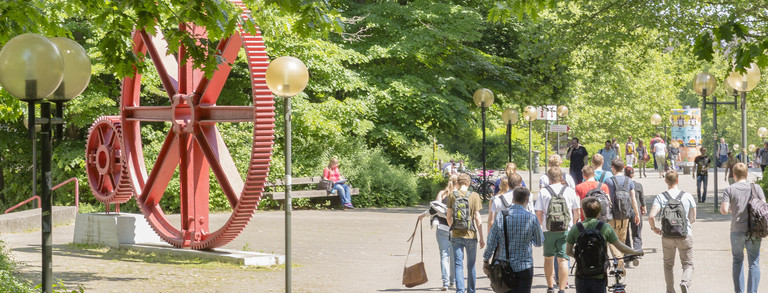Qualification Programme
The RTG-specific qualification programme consists of four different components:
- Study programme: Acquiring target-oriented scientific excellence is achieved by the compulsory study programme that is by design interdisciplinary. The six scientific modules cover both lectures in the disciplines toxicology, biostatistics, and bioinformatics, as well as practical courses in toxicological laboratories and in the pharmaceutical industry.
- Key skills courses: Training courses for doctoral researchers are offered by the graduate centres GZ of TU Dortmund University and iGRAD of HHU Düsseldorf, including compulsory courses on principles of good scientific practice (GSP) and research data management (RDM) and several courses on transferable skills such as project management and career planning.
- Communication and presentation skills: Academic communication is further promoted by a regular seminar, a yearly retreat, talks and seminars from visiting researchers, and participation in national and international conferences.
- Independence: Starting and building up a scientific career in academia or industry are supported by acquiring early scientific independence through participation in the governance of the RTG, independent organisation of the retreats and invitation of guest researchers.
| Type | Duration | Frequency | Contents | Location |
|---|---|---|---|---|
| RTG study programme | Usually 2-4 SWS per semester | Usually one course per semester | As defined by RTG study programme (see below this table) | Dortmund, Düsseldorf |
| RTG seminar | Talk (45 minutes plus discussion) | Up to twice per month (depending on number of participants) | Internal talks of doctoral and postdoctoral researchers of the RTG | Dortmund, Düsseldorf |
| RTG retreat | Two days | Once per year | Colloquium with doctoral and postdoctoral researchers of the RTG, supervisors, and guests | Research centre not on-site |
| Key skills courses | Variable, often 1 day | Regularly, GSP and RDM every year | Different courses, in particular on GSP and RDM | Dortmund, Düsseldorf |
| Talks from visiting researchers | Talk plus discussion | Approximately 12 times per year | Talks related to RTG topics | Dortmund, Düsseldorf |
| Workshops from visiting researchers | 3 - 5 days | Approximately once per year | Seminars related to RTG topics | Dortmund |
| Talks / participation at conferences | Variable | Variable | Talks presenting own research of doctoral researchers | Variable |
Study Programme
The study programme will ensure that all required components are available both in Dortmund and in Düsseldorf, regarding both biostatistics/bioinformatics and toxicology. Key skills are taught via the graduate centres of the two universities involved, i.e. the iGRAD (Interdisciplinary Graduate and Research Academy Düsseldorf, IUF is an iGRAD member) at HHU Düsseldorf and the Graduate Centre at TU Dortmund University.It includes training and further education in six modules. Modules 1, 2, 3, and 6 are compulsory for doctoral researchers in the RTG. Modules 4 and 5 are additional offers.
| Module | Duration | Frequency | Location |
|---|---|---|---|
| 1: Toxicology | 2 SWS | Once per year | Dortmund, Düsseldorf |
| 2: Laboratory | 1 week | Once per year | Dortmund (IfADo), Düsseldorf (IUF) |
| 3: Statistics in toxicology | 4 SWS | Once per year in Dortmund, once every 2-3 years in Düsseldorf | Dortmund, Düsseldorf |
| 4: Biostatistics and bioinformatics | 2-4 SWS per course | Once per year | Dortmund, Düsseldorf |
| 5: Data science | 2-4 SWS per course | Once per year | Dortmund |
| 6: Industry | 1 week | Variable | Various industrial partners |


